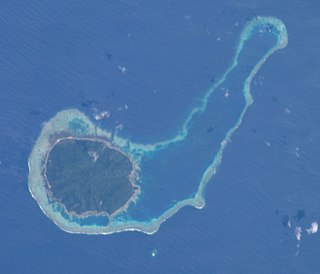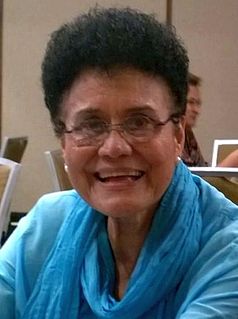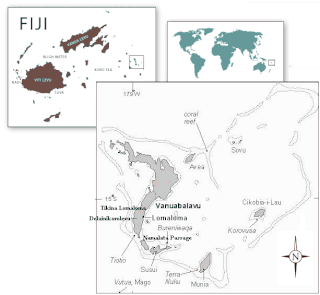
Ratu Sir Kamisese Mara, CF, GCMG, KBE was a Fijian politician, who served as Chief Minister from 1967 to 1970, when Fiji gained its independence from the United Kingdom, and, apart from one brief interruption in 1987, the first Prime Minister from 1970 to 1992. He subsequently served as President from 1993 to 2000. He is considered the founding father of the modern nation of Fiji.

Brigadier-General Ratu Epeli Nailatikau, CF, LVO, OBE, MSD, KStJ, is a Fijian chief who was President of Fiji from 2009 to 2015. He has had a long career in the Military, diplomatic service, and government. From 2001 to 2006 he served as Speaker of the House of Representatives – the lower and more powerful chamber of the Fijian Parliament. He was also the chairman of the Parliamentary Appropriations Committee and of the House Committee. On 8 January 2007, he was appointed the interim Minister for Foreign Affairs and External Trade; he was moved to the post of interim Minister for Provincial Development and Multi-Ethnic Affairs in September 2008. In October 2008, he became Indigenous Affairs Minister "and effectively Great Council of Chiefs chairman". On 17 April 2009, he was appointed Vice-President by the Military government.

Ratu Sir George Kadavulevu Cakobau was Governor-General of Fiji from 1973 to 1983. A great-grandson of Ratu Seru Epenisa Cakobau, the King of Bau who had unified all the tribes of Fiji under his reign in the mid-1800s and subsequently ceded the islands to the United Kingdom in 1874, Ratu Sir George held the traditional titles of Vunivalu of Bau and Tui Levuka and thus was considered by many as Fiji's highest-ranking traditional chief. Ratu Cakobau was appointed Governor-General in 1973, becoming the first indigenous Fijian to serve as the representative of Queen Elizabeth II.

Josaia Voreqe Bainimarama, commonly known as Frank Bainimarama, is the 8th and current prime minister of Fiji since 2007. A member of the Fiji First Party, he began his career as a naval officer and commander of the Fijian Military Forces.
Ratu Sir Josefa Lalabalavu Vana'ali'ali Sukuna was a Fijian chief, scholar, soldier, and statesman. He is regarded as the forerunner of the post-independence leadership of Fiji. He did more than anybody to lay the groundwork for self-government by fostering the development of modern institutions in Fiji, and although he died a dozen years before independence from the United Kingdom was achieved in 1970, his vision set the course that Fiji was to follow in the years to come.
Kubuna is one of the three confederacies that make up Fiji's House of Chiefs, to which all of Fiji's chiefs belong.
Ratu Alifereti Finau Mara was a Fijian lawyer, politician, and diplomat. He was best known as the eldest son of former Prime Minister and President Ratu Sir Kamisese Mara. Since December 2001, he held the official position of Roving Ambassador and High Commissioner, representing Fiji's interests in Pacific Island nations. It was reported on 13 March 2006 that he had been chosen to succeed his late father as Paramount Chief of the Lau Islands, but in 2009 the succession was still unclear, with Mara reportedly refusing to discuss the issue with the village elders.

Turaga na Vunivalu na Tui Kaba is the Paramount Chief of the Kubuna Confederacy, loosely translated the title means Warlord of Bau or Root of War. The succession to the title does not follow primogeniture, but the candidate must be a high-ranking member of the Tui Kaba clan.

Kanacea (Kanathea) is a volcanic island with seven peaks in Fiji's Lau archipelago. It is 15 km west of Vanua Balavu. Covering an area of 12.48 square kilometres, it has a maximum elevation of 259 meters.

The monarchy of Fiji arose in the mid-nineteenth century when native ruler Seru Epenisa Cakobau consolidated control of the Fijian Islands and declared himself King or paramount chief of Fiji. In 1874, he voluntarily ceded sovereignty of the islands to Britain, which made Fiji a Crown colony within the British Empire. After nearly a century of British rule, Fiji became a Dominion, an independent sovereign state within the Commonwealth of Nations with Elizabeth II as head of state. After a second military coup in 1987 led by Lieutenant Colonel Sitiveni Rabuka, Fiji became a republic, and the monarchy was ended. Nevertheless, the Great Council of Chiefs recognised Elizabeth II as Tui Viti or the traditional Queen of Fiji, but the position is not one of a constitutional, or otherwise legal nature. The Great Council of Chiefs was disestablished in 2012 by decree of President Ratu Epeli Nailatikau. Elizabeth II does not use the title, and the Fijian government does not recognise it.

Adi Mere Tuisalalo Samisoni is a Fijian kutiya and bajaru, from Lomaloma village on the island of Vanua Balavu in Fiji's Lau archipelago. Samisoni served as a Member of Parliament for the Opposition Party SODELPA but lost her seat in the 2018 General Elections. She holds a Doctorate and master's degree in Business Administration and owns Hot Bread Kitchen and resides in Suva Fiji's Capital. She has served as Mayor of Lami and as a member of the now-defunct House of Representatives.
Adi Litia Qionibaravi is a Fijian chief and member of the Parliament of Fiji. She is a member of the Social Democratic Liberal Party.
Imrana Jalal, sometimes known as Patricia Jalal is a Fijian lawyer and activist of Indian descent, who served as a Human Rights Commissioner on the Fiji Human Rights Commission, and human rights advisor to the Pacific Regional Rights Resource Team and the United Nations United Nations Development Program and as a member of the Geneva-based International Commission of Jurists, to which she was elected in May 2006. She is a founding member of the Fiji Women's Rights Movement. She continues to sit on its Board as a non-residential Permanent Founding Member. She is associated with the international networks Women Living Under Muslim Law (Pakistan), and the Asia Pacific Forum for Women, Law and Development (Thailand). Jalal worked at the Asian Development Bank in Manila, Philippines for 7 years, as a Principal Social Development Specialist. Jalal was appointed to the Inspection Panel of the World Bank in January 2018 for a term of 5 years. She was made Chair of the Inspection Panel in December 2018 and will hold that position until June 2021, making her a Vice-President of the World Bank. Jalal is currently working full-time and is based in Washington, DC, USA at the World Bank HQ. The Inspection Panel is the World Bank's international accountability mechanism, receiving complaints against the Bank's projects and investments in the developing world.

Turaga na Rasau is a traditional Fijian chiefly title of the Lau Islands. Prior to Fiji's colonial days, Fiji had many different Vanua with their own Paramount Chieftain which exercised no authority over the other; a saying from the island of Kadavu aptly summarises it "Nomu Turaga o sega na noqu Turaga" or "Your Chief is not my Chief" also the people of Beqa Island were of a similar opinion saying "Qali Cuva Ki Lagi" or "Subject only to heaven" and would bow to no outside Chieftain, but at the turn of the 20th century aspects of the traditional social structure remained, but for administrative purposes three main Matanitu were solidified and formed as they were the dominant consolidated powers at the time being that of Kubuna, Burebasaga and Tovata. With regard to the Rasau while its traditional origins were in Kubuna on Bau the titles traditional authority in modern Fiji is now in Tovata, Lau in particular Lomaloma Tikina on the Island of Vanua Balavu.
Ulamila Kurai Wragg born 18 June 1968 is a Fijian journalist currently based in Rarotonga, Cook Islands.
Ratu Rakuita Saurara Vakalalabure is a Fijian lawyer and former politician. He was first elected to the House of Representatives in 1999 and following the elections after the 2000 political uphevals was a candidate of the Conservative Alliance (CAMV). He was re-elected to the House of Representatives, winning the Cakaudrove West Fijian Communal Constituency in the parliamentary election of 2001, following in the footsteps of his father, Ratu Tevita Vakalalabure, who claimed to hold the chiefly title of Vunivalu of Natewa, in Cakaudrove Province, and who served in both houses of Parliament from the 1970s to the 1990s. He was subsequently appointed Deputy Speaker of the House of Representatives, but on 5 August 2004, he was sentenced to six years' imprisonment for his role in the Fiji coup of 2000, however the sentence was successfully reduced on appeal.
Turaga na Roko Tui Bau is a vassal chief to the Vunivalu of Bau, Paramount Chief of the post Cakobau government divisional categorization of enclaves rearing Kubuna Confederacy.

Ratu Deve Toganivalu was a Fijian chief and politician. He was Roko Tui of Bua from 1909 until 1928 and a member of the Legislative Council between 1926 and 1938.
Ratu George Toganivalu was a Fijian chief and politician. He was Roko Tui of Bua and Ba, and a member of the Legislative Council between 1940 and 1951.
Ratu Julian Nasaroa Brown Toganivalu was a Fijian chief, civil servant and politician. He was a member of the House of Representatives for three days in 1977.









